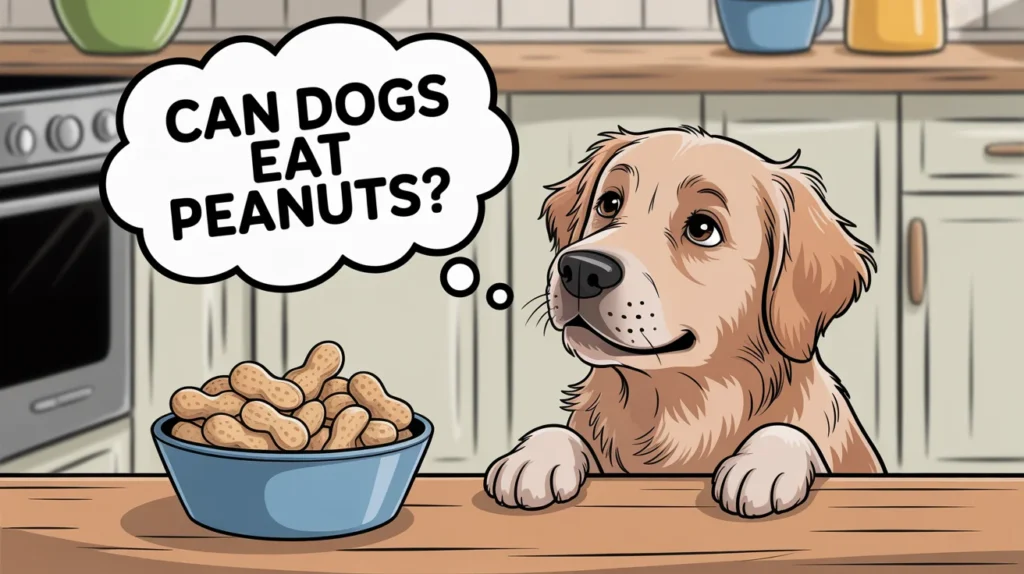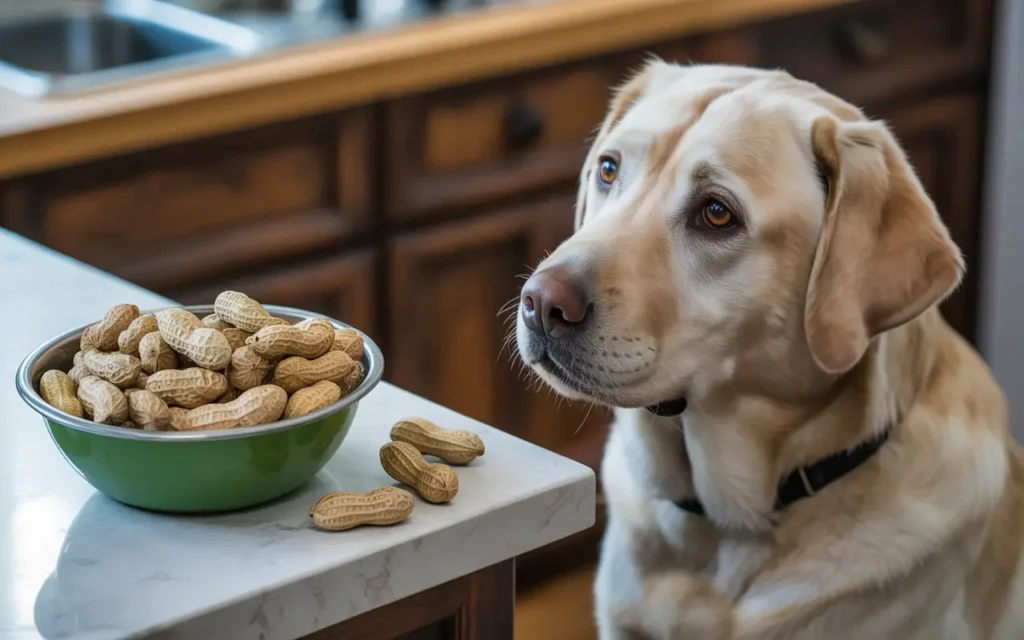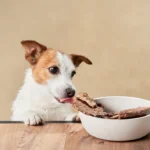Can Dogs Eat Peanuts? Safe or Risky Treat?
Many dog owners wonder: Can dogs eat peanuts safely, or are they risky? The truth is, peanuts can be a healthy treat when prepared properly — but some types pose dangers. In this guide, you’ll learn the benefits, risks, safe serving methods, and vet-approved tips for giving peanuts to your dog.

Content
Nutritional Benefits of Peanuts for Dogs
Peanuts contain several nutrients that may provide small health benefits for dogs when offered occasionally:
- Vitamin B6 – supports brain health and metabolism
- Vitamin E – promotes a healthy coat and immune system
- Magnesium – helps with strong bones and muscle function
- Protein & healthy fats – provide energy and support muscles
While these nutrients can be beneficial, remember that dogs should get their primary nutrition from a complete dog food diet — peanuts are best as an occasional treat, not a staple.
Are Peanuts Good for Dogs?
Peanuts can be a safe, occasional treat when served properly. They are rich in protein, healthy fats, and essential nutrients, including:
- Vitamin B6 – supports metabolism
- Vitamin E – helps skin and coat health
- Niacin – aids in energy production
- Magnesium – supports strong bones
While nutritious, peanuts are also high in calories and fat, which can upset your dog’s stomach or lead to weight gain if given too often.
Can Dogs Eat Peanuts Butter?
Yes, dogs can enjoy peanut butter if it’s unsalted, unsweetened, and free of xylitol (a sugar substitute that is toxic to dogs). Many pet parents use peanut butter to hide pills, stuff chew toys, or make homemade treats.
Still, peanut butter should only be given in small amounts, since overfeeding can lead to obesity or even pancreatitis in some dogs.
Can Dogs Eat Peanuts In The Shell?
No, dogs should not eat peanuts in the shell. The shells are difficult to digest and may cause choking or intestinal blockages.
If your dog accidentally eats a few shells, keep an eye out for signs of stomach upset or difficulty passing stool.
My Dog Ate Salted Peanuts – What Should I Do?
Salted peanuts are not safe for dogs. Too much sodium can lead to dehydration, high blood pressure, or, in severe cases, sodium ion poisoning.
If your dog eats just a few salted peanuts, they will likely be fine—just make sure they have plenty of fresh water. But if they eat a larger amount, call your veterinarian immediately, especially if you notice:
- Vomiting
- Diarrhea
- Extreme thirst or frequent urination
- Lethargy
What To Do If My Dog Eats Peanuts Accidentally
If your dog eats a small amount of plain, unsalted peanuts without shells, they’ll usually be fine. Just monitor for signs of digestive upset like gas, diarrhea, or vomiting.
Contact your vet right away if:
- The peanuts were salted, flavored, or coated (e.g., honey-roasted, chocolate-covered).
- Your dog ate a large quantity.
- Your pup is a small breed, senior, or prone to pancreatitis.
Risks of Feeding Peanuts to Dogs
Not all peanuts are safe for dogs. Here are some potential dangers:
- Aflatoxins: Naturally occurring molds that sometimes contaminate peanuts and can be toxic to dogs.
- Salted or Flavored Peanuts: Too much salt can cause dehydration, high blood pressure, and even sodium poisoning.
- Peanut Shells: Hard to digest and may cause choking or intestinal blockages.
- Allergies: Some dogs may develop allergic reactions, including itching, swelling, vomiting, or breathing problems. If you notice these signs, stop feeding peanuts and contact your vet immediately.
Can Dogs Eat Boiled Peanuts?

Boiled peanuts are not recommended. They are often cooked with salt and spices, which are harmful to dogs. Even plain boiled peanuts may cause digestive upset and can carry mold if not stored properly.
Can Dogs Eat Dry Roasted Peanuts?
Yes, unsalted and unseasoned dry roasted peanuts are the safest option. They don’t contain added oils or salt, making them healthier than many packaged varieties.
Avoid flavored dry roasted peanuts, as seasonings like garlic, onion powder, or chili can be toxic.
Can Dogs Eat Peanuts Raw?
Yes, dogs can eat raw peanuts if they’re shelled and unsalted. However, raw peanuts can spoil quickly and may contain aflatoxin mold, which is toxic to dogs.
For safety, unsalted, dry roasted peanuts are a better choice than raw.
Can Dogs Eat Peanuts Everyday?
No, peanuts shouldn’t be a daily snack. While safe in moderation, feeding them every day can lead to weight gain, digestive issues, or pancreatitis.
Treats—including peanuts—should make up no more than 10% of your dog’s daily calories.
Safe Ways to Give Peanuts to Dogs
If you want to share peanuts with your dog, keep these tips in mind:
- Choose plain, unsalted, dry roasted peanuts.
- Always remove the shells.
- Limit portions (a few peanuts for large dogs, 1–2 for small dogs).
- Use xylitol-free peanut butter sparingly as a treat or toy filler.
Signs Your Dog May Be Having Trouble With Peanuts
Even safe peanuts can cause problems if eaten in large amounts. Watch for these warning signs:
- Vomiting or diarrhea
- Loss of appetite
- Abdominal bloating or discomfort
- Lethargy
- Difficulty breathing (rare, allergic reaction)
Seek veterinary care immediately if you notice these symptoms.
Fun Peanut Snack Ideas for Dogs
Want to let your pup enjoy peanuts in a safe, fun way? Try these ideas:
- Peanut Butter Kong – Fill a chew toy with xylitol-free peanut butter and freeze it.
- Homemade Peanut Treats – Add a spoon of peanut butter to dog-safe biscuits.
- Peanut-Carrot Snack – Spread a thin layer of peanut butter on carrot sticks for a crunchy snack.
Final Thoughts: Can Dogs Eat Peanuts?
Yes, dogs can eat plain, unsalted, and shelled peanuts in small amounts. They provide some nutrients but also carry risks like aflatoxins, salt, and potential allergies. To keep your dog safe, offer peanuts only occasionally and never as a regular part of their diet. For a healthier routine, stick to vet-approved treats and fresh alternatives like carrots or apples. When in doubt, consult your veterinarian before adding peanuts or any new snack to your dog’s diet.
For more natural health tips, check out our guide on Turmeric For Dogs and its benefits.
FAQs
Are peanuts toxic to dogs?
No, plain unsalted peanuts are not toxic to dogs, but too many can cause stomach upset and weight gain.
Why can dogs eat peanut butter but not peanuts?
Dogs can eat both, but peanut butter is softer and easier to digest, while whole peanuts can pose choking and fat-related risks.
How many peanuts are too many for a dog?
Just a few shelled, unsalted peanuts are safe; more than a small handful may upset digestion or trigger pancreatitis.
What are the most toxic nuts for dogs?
Macadamia nuts, walnuts, and pecans are highly toxic to dogs and should always be avoided.

Jerry takes a deep dive into the aquatic world. He’s your go-to for setting up the ideal fish tank, with expert advice on water quality and fish care.












